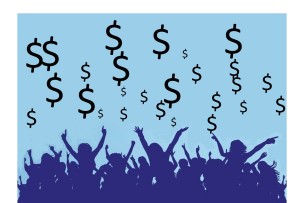Crowdfunding adventures continue

Last year, crowdfunding was not much more than a word to me
But now I’ve got my hands just a little bit dirty, the potential of crowdfunding I wrote about a few weeks ago makes more sense than ever.
Dreadtown
When researching crowdfunding for my previous article, I decided to invest in a project by reggae band Steel Pulse, called Dreadtown. This was really just me buying a DVD which is yet to be produced. That campaign on Indiegogo failed to reach its target, yet the band continued their campaign to raise $10,000 cash beyond the closing date through offering more “perks”. This last bout of funding raised over $13,000, so that’s it in the bag.
I feel ashamed to say I didn’t pledge any more money to the project. But why should I feel this way? Perhaps the retail world has become too anonymous these days, yet even with Indiegogo in between, I felt I was dealing directly with Steel Pulse as if they were friends, and were waiting for me to fulfil my part of a bargain.
Campaigning like this is a well known method which charities use, where existing donors are encouraged to give even more money. Not wanting to take anything away from charities here any more than I would Steel Pulse. In fact I felt relieved that the money was raised. But I have a better understanding of how a crowdfunding campaign works.
Klondike Strike
At a recent event, in my capacity as representative of Euromoney Indices, I ran into Chad Williams, CEO of Klondike Strike. Klondike Strike is a crowdfunding platform set up for a specific purpose: to raise money for mining companies. Anyone following the mining sector will know that miners are having a tough time of things. Commodity prices have dropped, mines are being closed and thousands of employees are being laid off. A new mining company has a lot of trouble convincing professional investors to take a stake in their venture. But why should financing always be controlled by banks and other financial institutions? Klondike Strike misses out this middle layer, resulting in lower costs for the mining companies and direct access to revenue streams or shares in discoveries for small investors. This is one company I shall be watching closely.
Seedrs
My previous article generated some positive feedback, but also some incredulity that I didn’t mention Seedrs. So here goes.
Seedrs is a UK crowdfunding platform that has now raised over £100m in investments for their customers. Investments result in equity ownership of the company raising the money, rather than lending or even giving money. Equity raising campaigns seek to reach a target total investment, and if the target is not reached, the investors get their money back. So it’s an all-or-nothing outcome. Seedrs makes its money by keeping 7.5% of the profit generated by companies it has raised money for. Seedrs also acts as nominee for investors, meaning that the investor beneficially owns the shares (i.e. they receive any income and proceeds of sales) but the shares are legally owned by Seedrs. This might sound suspicious, but nominee accounts have been around for a long time and most investors using stockbrokers will have their shares held in a nominee account.
Seedrs raised over £1 million for FreeAgent, an accounting software package. Currently beer and cider company Curious Brew is raising £1 million but investments have now reached over £1.5 million, valuing the company as a whole at some £17 million. In terms of the stock market, these companies are very small. But with a few years of growth, who knows? A crowdfunded company might make it into a leading UK stock market index.







